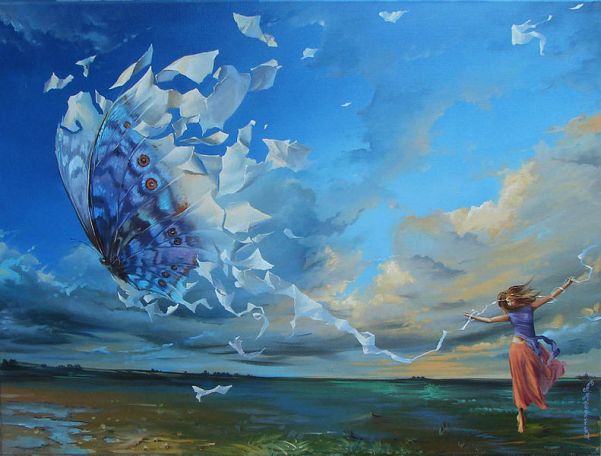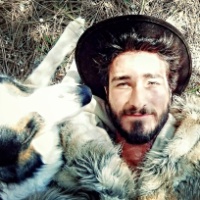This idea of a universal connection has been a topic among many these days.
New technologies and instruments in science have begun to open up our eyes and allow us to measure relationships, not only in the natural world, but in our own biochemistry that has never been recorded or looked at before.
Chaos theory is an incredible concept, but it can be a pretty difficult one to put into perspective.
We have almost all heard of the “butterfly effect,”—the idea that one stroke of a butterfly’s wings on one side of the planet can have a ripple effect that causes a dramatic change on the other side of the world.
Edward Lorenz was an unbelievable mathematician. Through numbers he helped to pinpoint this concept of a connection among all things, big and small; a universal connection. Chaos theory had been being spoken of for years before by many different scientists, but it wasn’t until the computer was invented that Lorenz was able to create a program to chart such complex algorithms.
The theory’s structure originated in the literature about the three body problem by Henri Poincare in 1890. In the three body problem, the question is posed: if you have three different objects of different masses moving at different velocities starting from different points at different times, when and how would they affect each other?
The physics behind tracking the motion of these objects was a premise for further exploration into the math behind the subtle connection we see in ourselves and the environment and all around us all the time! But still, what does this mean? I’ve spoken in previous articles of our connection to nature, but what of our connection to each other? These subtle influences and changes are happening at sub-atomic levels within us all the time, but what’s beyond the numbers? What does this look like in human life?
I’m going to tell you a story, because the math can only take us so far.
Imagine a family. They live on the outskirts of a small town, a beautiful mother and daughter and loving father. The parents own a bakery together that they run out of the front of the house. Their daughter loves to hang out in the kitchen as flour and laughter dust the air, with the smell of fresh bread and the warmth of the oven.
But, one day, the father is forced to go to war and leave his family, and never returns. The family is devastated, and all the light seems to slip from the home. The mother barely gets by without her husband to help in the bakery and to make matters worse. she takes to drinking. The daughter stops hanging out in the kitchen, as the laughter has seized and the oven’s warmth only pulls at the hollowness that has made its own eternity somewhere deep in her bones. She starts spending more of her time in the yard, watching the clouds and playing in the earth, away from the chaos of her broken mother.
Because the little girl spends so much time alone, she decides one day that she’ll plant a tree in the yard. She begs her mom who finally gives in without too much questioning. They bring home a fine oak sapling that the little girl tenderly plants in the yard. The tree is symbolic for the girl’s father, someone strong and steady, and she confides in the tree as they grow together, until one day it’s time for her to leave the house of her childhood and start her own life.
Years have passed, and the girl finds love and starts a family of her own—two vivacious baby boys. But after a few months she realizes there’s a problem with one of her sons. She takes him back to the hospital and the doctors discover he has a heart defect and is going to need surgery. She feels devastated. Why is this happening? The doctor tells her that she should rejoice because this particular pediatric surgery has recently been made 99 percent effective and safe by a woman who works in their clinic.
She can’t believe it and her heart swells with hope—what are the odds? Her son’s surgery is scheduled for a little later that day, it is fast and afterward she watches her son through the window, sleeping peacefully, as if nothing had ever happened.
“He’s going to be just fine,” a voice sounds from behind. The girl turns around to see a woman in a surgeon’s outfit standing behind her, with compassion in her eyes. “I’ve done this many times before.”
“Are you the one who modified this surgery?” The girl asks.
“Yes, yes I am,” the woman smiles.
“Thank you, thank you so much, I nearly lost all hope when the doctors told me the news. You are an angel.”
“I just want to be able to help others. My husband passed away a few years back because of a problem with his heart, and after that I guess I vowed I would help as many people as I could not to have to go through the same ordeal.”
“That’s so beautiful…and so sad, I’m very sorry about your husband.”
“That’s okay. He was and still is the best thing that ever happened to me. Even though he’s not here, he still gives to me, like he did today, with your son. If it wasn’t for him, I wouldn’t have been able to save your baby boy.” The woman’s eyes brighten with tears and she swallows a bit.
“How did you meet your husband?” The girl asks, earnestly wanting to know.
“We met by serendipity actually. We were both bike riding across the state; he was heading to a friend’s house and I was heading to my parents. It was just timing that we happened to be on the same frontage road outside of a small town a little ways from here. It started raining cats and dogs out of nowhere and we were forced to take shelter under this beautiful oak tree near what looked like a broken down bakery. The moment we started talking, that was it, we decided to travel together the rest of the way, and it only rooted what was so natural from the beginning. I fell in love under that tree that day and never looked back.”
The girl begins to sob, and the doctor pulls herself from her thoughts and puts her arm around the woman, not understanding the sudden burst of emotion. The girl’s mind swirls, and suddenly life opens up into the most beautiful mandala she can imagine, every small bit of color and design connected and moving, and only when viewed from afar can one truly recognize its stunning beauty.
“I planted that tree,” is all she can say, and the doctor, now in tears as well, holds her tighter as her son’s steady heartbeat chimes on the screen beyond the window.
We don’t know how far our actions reach, or where the ripples of our decisions go. To understand life in all its connection would take more than a lifetime, but it only takes one moment of choice to respect it. We are responsible for our reality—each and every one of us. Bad things don’t happen to us because we are bad people; justice is a human moral that the universe knows not of. The universe simply understands balance. Give and take. It’s up to us how we respond to what we are given, and I promise, we are never given more then we can carry. Our choices choose who we are.
The girl’s father had to go to war and then he died—and if this was the only color in this mandala we saw, it would be an ugly shade. It’s only when we zoom out that we can see the beauty that such pain brought. If not for his death, the mother never would have taken to drinking and the girl never would have wanted to plant a tree. Without that tree, the symbol of her father, the doctor never would have met her husband and the girl might have lost her son.
It’s only when we can see the endless beauty and humility of our existence that we can embrace this life as the strange and relentlessly magical gift that it is.
Like molecules bouncing off of each other and creating different substances, we too are constantly affecting and changing each other and ourselves through the actions and thoughts and words we choose. A butterfly knows not the destruction one beat of its wings may bring, but this is the elixir that allows growth and gives us life.
“I offer what has surprised me in my pain, that life is not fair, but unending in its capacity to change us; that compassion is fair and feeling is just, and that we are not responsible for all that befalls us, only for how we receive it, and how we choose to hold each other up along the way.” ~ Mark Nepo, The Book of Awakening
Author: Rainer M. Jundt
Editor: Catherine Monkman







Read 0 comments and reply